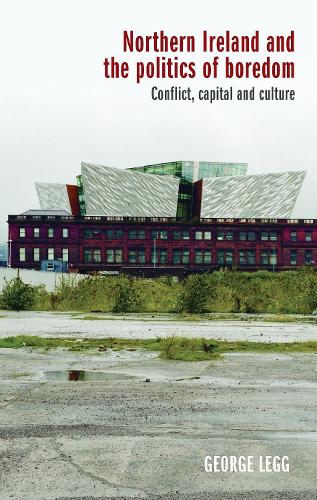
Northern Ireland and the Politics of Boredom: Conflict, Capital and Culture
(Hardback)
Available Formats
Publishing Details
Northern Ireland and the Politics of Boredom: Conflict, Capital and Culture
By (Author) George Legg
Manchester University Press
Manchester University Press
13th September 2018
13th September 2018
United Kingdom
Classifications
Physical Properties
Hardback
232
Width 156mm, Height 234mm
Description
This book provides a new interpretation of the Northern Irish Troubles. From internment to urban planning, the hunger strikes to post-conflict tourism, it asserts that concepts of capitalism have been consistently deployed to alleviate and exacerbate violence in the North. Through a detailed analysis of the diverse cultural texts, Legg traces the affective energies produced by capitalism's persistent attempt to resolve Northern Ireland's ethnic-national divisions: a process he calls the politics of boredom. Such an approach warrants a reconceptualization of boredom as much as cultural production. In close readings of Derek Mahon's poetry, the photography of Willie Doherty and the female experience of incarceration, Legg argues that cultural texts can delineate a more democratic - less philosophical - conception of ennui. Critics of the Northern Irish Peace Process have begun to apprehend some of these tensions. But an analysis of the post-conflict condition cannot account for capitalism's protracted and enervating impact in Northern Ireland. Consequently, Legg returns to the origins of the Troubles and uses influential theories of capital accumulation to examine how a politicised sense of boredom persists throughout, and after, the years of conflict. Like Left critique, Legg's attention to the politics of boredom interrogates the depleted sense of humanity capitalism can create. What Legg's approach proposes is as unsettling as it is radically new. By attending to Northern Ireland's long-standing experience of ennui, this book ultimately isolates boredom as a source of optimism as well as a means of oppression. -- .
Reviews
In that the book rethinks Northern Ireland in terms other than the established one of political divisions it is already significant. In that it focuses on a potentially progressive mode of understanding actualities which transcend old binaries it is doubly significant.
British Association for Irish Studies book prize judges, Highly Commended
Author Bio
George Legg is Lecturer in Liberal Arts and London at King's College, London
